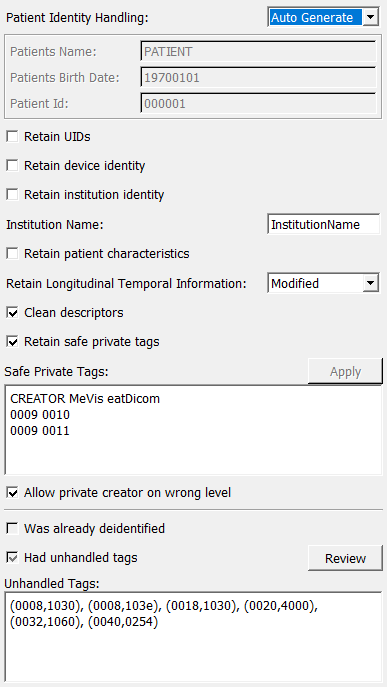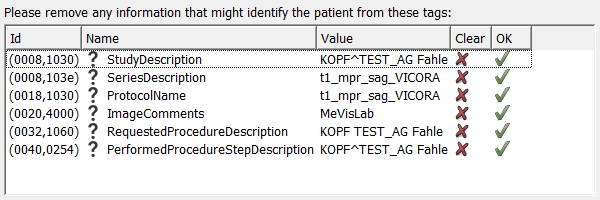DicomDeidentify¶
- MLModule¶
author
package
dll
definition
keywords
anonymization,anonymizer,pseudonymization,pseudonymizer,hipaa
Purpose¶
The module DicomDeidentify performs the anonymization of DICOM data according to DICOM standard PS 3.15 annex E.
Usage¶
Select the required de-identifying options from the panel in the module, and connect a DICOM source—either an ML image or a pure DICOM tree—to the module (note: only one input will be de-identified). The de-identifying step will be performed immediately; however, depending on the selected options, some tags may require manual inspection (indicated by the Had Unhandled Tags flag). In such cases, the Review button must be clicked to go through the list of unhandled tags.
Tips¶
The anonymization will not be performed if the tag PatientIdentityRemoved (0012, 0062) is already set in the dataset with a value of “YES.” In this case, the DICOM information is passed through unchanged, and Was Already Deidentified is set.
Windows¶
Default Panel¶

Review¶

Panel for performing a manual inspection of tags for identifying information. The user can either click on the check-mark for a tag to confirm that the tag does not contain any identifying information, or click on the cross to remove all content from that tag, or long-click on the value to edit the value.
If all values have been marked as reviewed (recognizable by the fact that all question marks have vanished), Had Unhandled Tags is unset and the output of this module is updated with the resulting DICOM information.
There is also a context menu on the list to restore the original value of a tag if it has been changed accidentally.
Input Fields¶
input0¶
- name: input0, type: Image¶
An image input for images with DICOM information needing anonymization.
inDicom¶
- name: inDicom, type: DicomTree(MLBase)¶
A Base input for pure DICOM information needing anonymization.
For accessing this object via scripting, see the Scripting Reference:
MLABDicomTree.
Output Fields¶
output0¶
- name: output0, type: Image¶
This output contains the image with the de-identifying step applied to all DICOM tags of
input0. This will be invalid whileHad Unhandled Tagsis set.
outDicom¶
- name: outDicom, type: DicomTree(MLBase)¶
This output contains the DICOM tree from
inDicomwith the de-identifying step applied to all DICOM tags. This will be empty whileHad Unhandled Tagsis set, or whileoutput0has a valid image connected (since the anonymization is only performed on one input at a time).For accessing this object via scripting, see the Scripting Reference:
MLABDicomTree.
Parameter Fields¶
Field Index¶
|
|
|
|
|
|
|
|
|
|
|
|
|
|
|
|
||
|
|
|
|
|
Visible Fields¶
Patient Identity Handling¶
- name: patientIdentityHandling, type: Enum, default: PI_CLEAR¶
Defines how to handle the main patient identity tags PatientsName, PatientsBirthDate, and PatientId.
Values:
Title |
Name |
Description |
|---|---|---|
Clear |
PI_CLEAR |
Clear these tags. |
User Defined |
PI_USER_DEFINED |
Set the values provided in the fields |
Auto Generate |
PI_AUTO_GENERATE |
Replace the patient name with a fantasy name derived from a cryptographic hash value of the original patient name and birth date. Replace birth date with a date in the same decade derived from the same cryptographic hash value. Remove patient ID. Note The result of this algorithm is highly sensitive to even minor changes in the patient’s name or birth date. Small modifications, such as variations in notation, can result in completely different names. See |
Patients Name¶
- name: patientsName, type: String, default: PATIENT¶
Sets the patient’s name if
Patient Identity Handlingis set to user-defined.
Patients Birth Date¶
- name: patientsBirthDate, type: String, default: 19700101¶
Sets the patient’s birth date if
Patient Identity Handlingis set to user-defined.
Patient Id¶
- name: patientId, type: String, default: 000001¶
Sets the patient’s ID if
Patient Identity Handlingis set to user-defined.
Institution Name¶
- name: institutionName, type: String, default: InstitutionName¶
Sets a tag that will be used as a value for the InstitutionName tag if
Retain Institution Identityis false.
Retain UIDs¶
- name: retainUIDs, type: Bool, default: FALSE¶
If checked, UIDs that would otherwise be replaced by their hashed counterparts will remain unchanged.
This option directly implements the provision from the DICOM standard.
Retain Device Identity¶
- name: retainDeviceIdentity, type: Bool, default: FALSE¶
If checked, the identity of the devices used during the acquisition is retained.
This option directly implements the provision from the DICOM standard.
Retain Institution Identity¶
- name: retainInstitutionIdentity, type: Bool, default: FALSE¶
If checked, the identity of the institution where the acquisition took place is retained.
This option directly implements the provision from the DICOM standard.
Retain Patient Characteristics¶
- name: retainPatientCharacteristics, type: Bool, default: FALSE¶
If checked, , tags containing patient characteristics, such as medication or allergies, are retained.
If such tags exist, they may require a manual review step to remove identifying information, indicated by the
Had Unhandled Tagsflag.This option directly implements the provision from the DICOM standard.
Retain Longitudinal Temporal Information¶
- name: retainLongitudinalTemporalInformation, type: Enum, default: OFF¶
Defines how to handle certain temporal information in the DICOM dataset.
This option directly implements the option from the DICOM standard.
Values:
Title |
Name |
Description |
|---|---|---|
Off |
OFF |
Temporal information tags are removed. |
Full |
FULL |
Temporal information tags are retained. |
Modified |
MODIFIED |
Temporal information tags are retained but offset by a specific number of days (ranging from 1 to 365 days) derived from the cryptographic hash of the patient identity. Note The selected offset is highly sensitive to the formatting of the patient’s name and the exact birth date provided. |
Clean Descriptors¶
- name: cleanDescriptors, type: Bool, default: FALSE¶
If checked, tags containing descriptive information, such as the StudyDescription, are retained.
Since such tags may include free text, they require a manual review step to remove identifying information, indicated by the
Had Unhandled Tagsflag.This option directly implements the option from the DICOM standard.
Allow Private Creator On Wrong Level¶
- name: allowPrivateCreatorOnWrongLevel, type: Bool, default: FALSE¶
If checked, private tag creator elements of private tags in a sequence item are permitted to exist at a higher tree level than the private tag itself.
The DICOM standard requires that the creator element be contained in the same sequence item as the private tag itself; however, this is not always the case in the real world. This option allows the de-identification process to revert to creator elements from container items (or the root tree itself) if they are not found in the same sequence item. If this option is not set, private tags with an invalid creator will have an empty creator string and will be dropped.
Note
Since setting this option essentially involves guessing the creator string, there is a possibility that incorrect tags are retained and left unchanged.
Was Already Deidentified¶
- name: wasAlreadyDeidentified, type: Bool, persistent: no¶
Shows whether the incoming dataset has already been de-identified (as indicated by the PatientIdentityRemoved tag).
Review¶
- name: performReview, type: Trigger¶
When pressed, a panel opens to inspect the tags indicated by
Unhandled Tags.